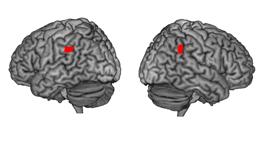Lose a tumour, gain self-transcendence.
 Lights and wings have been associated with spirituality in different cultures.Urgesi, C. et al.
Lights and wings have been associated with spirituality in different cultures.Urgesi, C. et al.Removing part of the brain can induce inner peace, according to researchers from Italy. Their study provides the strongest evidence to date that spiritual thinking arises in, or is limited by, specific brain areas.
To investigate the neural basis of spirituality, Cosimo Urgesi, a cognitive neuroscientist at the University of Udine, and his colleagues turned to people with brain tumours to assess the feeling before and after surgery. Three to seven days after the removal of tumours from the posterior part of the brain, in the parietal cortex, patients reported feeling a greater sense of self-transcendence. This was not the case for patients with tumours removed from the frontal regions of the brain.
"Self-transcendence used to be considered just by philosophers and crank new age people," says co-author Salvatore Aglioti, a cognitive neuroscientist at the Sapienza University of Rome. "This is the first really close-up study on spirituality. We're dealing with a complex phenomenon that's close to the essence of being human."
The authors pinpointed two parts of the brain that, when damaged, led to increases in spirituality: the left inferior parietal lobe and the right angular gyrus. These areas at the back of the brain are involved in how we perceive our bodies in spatial relation to the external world. The authors of the study in the journal Neuron1, say that their findings support the connection between mystic experiences and feeling detached from the body.
"The most surprising part was the rapidity of the change," says Urgesi. "This discovery shows that some complex personality traits are more malleable than previously thought."
The science of spirituality
The researchers interviewed 88 people with brain tumours of various severities. Twenty of these people had benign tumours and although they underwent surgery no brain tissue was removed. All 88 people participated in interviews about their religious habits and beliefs before surgery and afterwards answered a series of true or false questions that assessed spirituality. The questionnaire tapped into three main components of self-transcendence: losing yourself in the moment, feeling connected to other people and nature, and believing in a higher power. Examples of the items on the questionnaire include: "I often become so fascinated with what I'm doing that I get lost in the moment - like I'm detached from time and place" and "I sometimes feel so connected to nature that everything seems to be part of one living organism."
The researchers then mapped the precise areas of the patients' brains where they had lesions as a result of surgery.
 Spirituality was tracked to the the left inferior parietal lobe (left) and the right angular gyrus (right).Urgesi, C. et al.
Spirituality was tracked to the the left inferior parietal lobe (left) and the right angular gyrus (right).Urgesi, C. et al.Previous studies have shown that a broad network of frontal and parietal brain regions underlies religious beliefs 2,3,4,5. But spirituality does not seem to involve exactly the same regions of the brain as religion.
In the past, neurologists have observed spiritual changes in patients with brain damage, but it is not something they systematically evaluate. "We usually stay away from it, not because it's not an important topic, but because it's very private and personal," says Rik Vandenberghe, a neurologist at the University Hospital Gasthuisberg in Leuven, Belgium. "This paper is very interesting, but like many pioneering studies, it leaves open many questions." Vandenberghe, who uses a similar lesion-mapping technique, says the data should be interpreted with caution. "It's very unlikely that something like self-transcendence is localizable to just two brain areas," he says.
Coarse measure
Probably the most worrisome aspect of the study is the way the authors measured self-transcendence. "It's important to recognize that the whole study is based on changes in one self-report measure, which is a coarse measure that includes some strange items," says cognitive neuroscientist Richard Davidson of the University of Wisconsin-Madison. "In the future, it will be important to understand why lesions in the parietal cortex induce changes on this scale."
"Self-transcendence is an abstract concept, and different people will attribute different meanings to the word," says Vandenberghe. Patient self reporting is not always accurate, he says, adding that tapping into spirituality with more rigorous behavioural measures and pinpointing the specific thoughts and feelings that constitute it are the obvious next steps.
In future studies, Urgesi would like to measure other aspects of spirituality and determine how long changes in spirituality last in patients. He'd also like to inactivate parietal regions in healthy subjects using transcranial magnetic stimulation (TMS), a non-invasive technique that temporarily changes neural activity in a specific region, to see if he can induce immediate changes in self-transcendence. He envisions a day when TMS can be used to increase the feeling of self-transcendence in people with neurological or psychological disorders.Original here



No comments:
Post a Comment